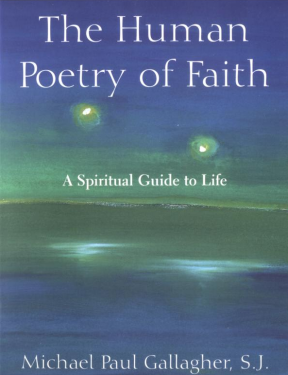This is the fifth column in a series
 AS I MENTIONED in last week’s column, one of the topics that we will find ourselves thinking about – if we give ourselves time for silence and solitude – will be friendship. In his marvelous little book, “The Human Poetry of Faith: A Spiritual Guide to Life” (New York: Paulist Press, 2001, pp. 142), Father Michael Paul Gallagher, S.J., suggests that friendship can prepare us to be open to the presence of Christ in our lives. He writes the following:
AS I MENTIONED in last week’s column, one of the topics that we will find ourselves thinking about – if we give ourselves time for silence and solitude – will be friendship. In his marvelous little book, “The Human Poetry of Faith: A Spiritual Guide to Life” (New York: Paulist Press, 2001, pp. 142), Father Michael Paul Gallagher, S.J., suggests that friendship can prepare us to be open to the presence of Christ in our lives. He writes the following:
“Friendship was described by Thomas Aquinas, an un-Romantic genius if ever there were one, as ‘the source of greatest joy.’ Without friends he added, even the most fulfilling activities become empty. Friendships are spaces where our capacity for life is nourished by others. We discover how to trust and how to be trusted. We learn to open up in wonder and to find new worlds in us that are brought to birth by the presence of another.
“Over these thirty years I’ve had to learn that there are very different languages of mutual presence. There is a joy and a cost in our being present to one another. But our quality of life, is measured by our skill in mastering these languages, by the ease and fluency of our being present – to ourselves, to others, and, ultimately, to God.” (p. 14)
I agree with everything that St. Thomas and Father Gallagher have written about friendship. I can enjoy activities that I engage in alone but it is a very different experience when activities are enjoyed with a friend. Though, at times, I may take friendships for granted, even the briefest reflection on them reminds me what great treasures friends are. They are among life’s greatest gifts.
Learning About Trust
An aspect of friendship that Father Gallagher points out, which I don’t think that I have appreciated sufficiently, is that we learn about trusting from friends. We can count on our friends when we are in difficult situations. As I am writing this what comes to mind is my experience with a knee replacement two years ago. Looking forward to the surgery, I imagined that there were about 10 things that could go wrong, which caused me some anxiety. Before undergoing the surgery, immediately after the surgery and in the weeks of rehabilitation, my friends made the entire experience much, much easier than if I went through it alone. That is one of countless examples of friends helping me.
I like Father Gallagher’s insight that there are different languages of mutual presence. Spouses, I imagine, should be present to one another in a way that neither is present to anyone else. In my own life I am present to friends in different ways depending on the nature of the relationship. But what applies to all friendships is that they nourish us, and to a great extent, they account for our quality of life.
What is of special interest to me is the way Father Gallagher links presence to self and others with presence to God. I have come to believe that one way of evaluating my relationship with God is by evaluating how I am present to friends. This is a relatively new approach for me.
When I was younger I thought of my relationship to God largely in terms of how many “religious activities” I performed and how I performed them. Of course, that should be an important dimension of anyone’s life, but recently, I have given special importance to reflecting on how I am present to other people. This has helped me to see that what we often call “the spiritual life” is not some life separate from our daily lives. Each of us lives one life and one dimension of that life, indeed the most important dimension, is how we relate to God. I have come to believe that one way of reflecting on how we relate to God is by reflecting on how we relate to other people.
During this Easter season we are reminded by the Church that the Risen Christ is always lovingly present to us. We are never alone or unloved. The Risen Christ’s presence can influence how we think, how our consciences develop and how we are lovingly present to God and others.
Father Robert Lauder, philosophy professor at St. John’s University, Jamaica, is the author of “Pope Francis’ Spirituality and Our Story” (Resurrection Press).
